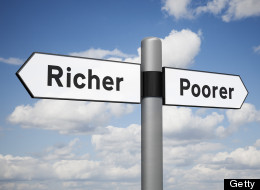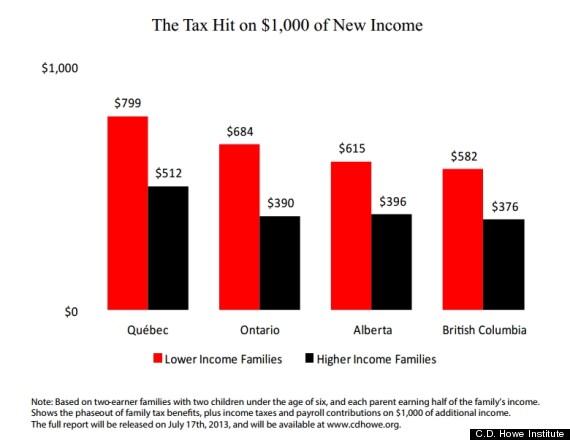Because of how taxes and government aid are structured, low-income Canadians lose the most money when they move up the earnings ladder, according to a new study from the C.D. Howe Institute.
The study from the conservative-leaning think tank found a typical family with two working parents and two children with an income of $40,000 would lose 68 cents for every additional dollar in income earned. (This number is known as the “marginal effective tax rate.”) That’s for a family in Ontario; in Quebec, that family would lose 79 cents for every dollar earned.
By comparison, a higher-income Ontario family, which the study defined as having $100,000 in income, would lose only 39 cents for each additional dollar of income.
This is because low-income earners not only pay more taxes as their income goes up, but also see clawbacks to government benefits, such as the Working Income Tax Benefit, the GST/HST Credit and the Canada Child Tax Benefit. Members of the working poor who strive to move up in the world are hit with a “double whammy” of higher taxes and fewer benefits.
In a sense, the C.D. Howe study is a rehash of an old conservative economic argument: That helping the poor creates a disincentive for them to help themselves. But the study is careful in its efforts not to appear as if it's attacking tax benefits for the poor. It doesn't suggest eliminating them, only halting them at current levels.
“Increasing those benefits does put more dollars in people’s hands,” said Finn Poschmann, VP of research at C.D. Howe, but “there’s a tradeoff when they’re clawed back, which makes it less worthwhile to take that extra shift.”
Poschmann urged the government instead to focus on what the study calls "universal" programs -- things such as adult literacy courses and retraining.
“Targeted cash transfers should not be expanded, absent a broader analysis of the tax and benefit system,” the study concludes.
However, there are other ways governments could reduce the impact of benefit clawbacks. For instance, the top income for which a family qualifies for a benefit could be raised, and the clawbacks could be spread out across a larger income range. This would reduce the impact on rising incomes, but would likely cost the government more in total benefit payouts.
Original Article
Source: huffingtonpost.ca
Author: Daniel Tencer
The study from the conservative-leaning think tank found a typical family with two working parents and two children with an income of $40,000 would lose 68 cents for every additional dollar in income earned. (This number is known as the “marginal effective tax rate.”) That’s for a family in Ontario; in Quebec, that family would lose 79 cents for every dollar earned.
By comparison, a higher-income Ontario family, which the study defined as having $100,000 in income, would lose only 39 cents for each additional dollar of income.
This is because low-income earners not only pay more taxes as their income goes up, but also see clawbacks to government benefits, such as the Working Income Tax Benefit, the GST/HST Credit and the Canada Child Tax Benefit. Members of the working poor who strive to move up in the world are hit with a “double whammy” of higher taxes and fewer benefits.
In a sense, the C.D. Howe study is a rehash of an old conservative economic argument: That helping the poor creates a disincentive for them to help themselves. But the study is careful in its efforts not to appear as if it's attacking tax benefits for the poor. It doesn't suggest eliminating them, only halting them at current levels.
“Increasing those benefits does put more dollars in people’s hands,” said Finn Poschmann, VP of research at C.D. Howe, but “there’s a tradeoff when they’re clawed back, which makes it less worthwhile to take that extra shift.”
Poschmann urged the government instead to focus on what the study calls "universal" programs -- things such as adult literacy courses and retraining.
“Targeted cash transfers should not be expanded, absent a broader analysis of the tax and benefit system,” the study concludes.
However, there are other ways governments could reduce the impact of benefit clawbacks. For instance, the top income for which a family qualifies for a benefit could be raised, and the clawbacks could be spread out across a larger income range. This would reduce the impact on rising incomes, but would likely cost the government more in total benefit payouts.
Original Article
Source: huffingtonpost.ca
Author: Daniel Tencer


No comments:
Post a Comment